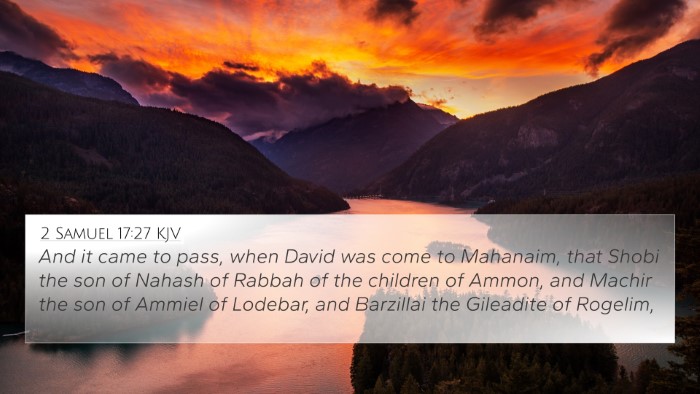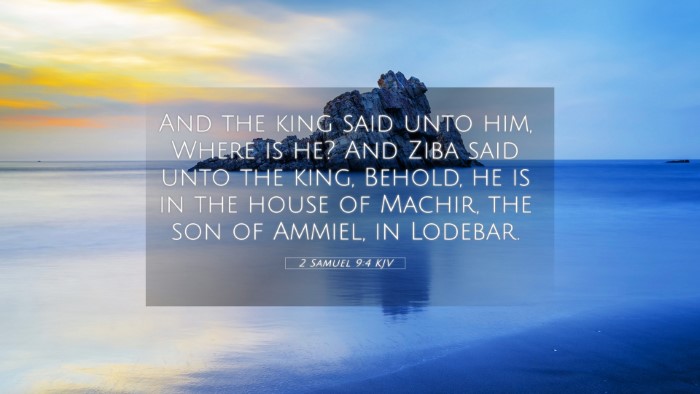Old Testament
Genesis Exodus Leviticus Numbers Deuteronomy Joshua Judges Ruth 1 Samuel 2 Samuel 1 Kings 2 Kings 1 Chronicles 2 Chronicles Ezra Nehemiah Esther Job Psalms Proverbs Ecclesiastes Song of Solomon Isaiah Jeremiah Lamentations Ezekiel Daniel Hosea Joel Amos Obadiah Jonah Micah Nahum Habakkuk Zephaniah Haggai Zechariah Malachi2 Samuel 9:4 Similar Verses
2 Samuel 9:4 Cross References
And the king said unto him, Where is he? And Ziba said unto the king, Behold, he is in the house of Machir, the son of Ammiel, in Lodebar.
Uncover the Rich Themes and Topics of This Bible Verse
Listed below are the Bible themes associated with 2 Samuel 9:4. We invite you to explore each theme to gain deeper insights into the Scriptures.
2 Samuel 9:4 Cross Reference Verses
This section features a detailed cross-reference designed to enrich your understanding of the Scriptures. Below, you will find carefully selected verses that echo the themes and teachings related to 2 Samuel 9:4 KJV. Click on any image to explore detailed analyses of related Bible verses and uncover deeper theological insights.

2 Samuel 17:27 (KJV) »
And it came to pass, when David was come to Mahanaim, that Shobi the son of Nahash of Rabbah of the children of Ammon, and Machir the son of Ammiel of Lodebar, and Barzillai the Gileadite of Rogelim,
2 Samuel 9:4 Verse Analysis and Similar Verses
Understanding 2 Samuel 9:4
Verse: 2 Samuel 9:4 - “And the king said unto him, Where is he? And Ziba said unto the king, Behold, he is in the house of Machir, the son of Ammiel, in Lodebar.”
Verse Meaning
The context of 2 Samuel 9:4 reveals King David's deep desire to show kindness to Mephibosheth, the son of Jonathan and grandson of Saul. This verse highlights the inquiry of King David about Mephibosheth's whereabouts, shedding light on themes of grace, redemption, and the restoration of broken familial ties.
Key Insights from Commentaries
-
Matthew Henry's Commentary:
Henry emphasizes the kindness of David towards Mephibosheth, noting that it illustrates God’s mercy towards those who are unworthy. The king's inquiry speaks to his character, as he seeks out the last remnant of Saul's house to show loyalty to his friend Jonathan.
-
Albert Barnes' Notes:
Barnes highlights the significance of Lodebar, a place of no pasture, symbolizing Mephibosheth's desolate condition both physically and spiritually. His being in such a place underscores the state of those who are excluded from society but whom God seeks to restore.
-
Adam Clarke's Commentary:
Clarke points out the importance of this moment as a pivotal shift in both David’s reign and Mephibosheth's life. He notes that Ziba is the intermediary, representing the connections between power, grace, and redemption present in the narrative.
Thematic Connections and Cross-References
This verse serves as a bridge connecting several themes and narratives throughout the Bible. Here are some cross-references to explore:
- 2 Samuel 4:4: Reference to Mephibosheth’s disability and background.
- 2 Samuel 9:7: David’s promise of kindness to Mephibosheth.
- 1 Samuel 20:14-15: The covenant of friendship between David and Jonathan.
- Psalm 113:7-8: God’s care for the lowly and the downtrodden, akin to Mephibosheth's state.
- Luke 14:21: Jesus’s parable about inviting the poor, echoing the theme of inclusion.
- Romans 5:8: God's grace towards sinners, paralleling David's kindness to Mephibosheth.
- Ephesians 2:12-13: The idea of being brought near, akin to Mephibosheth’s restoration to the king’s table.
Connecting Biblical Texts
This verse is a rich testament to the connections found throughout Scripture, emphasizing the importance of cross-referencing Bible texts to gain a deeper understanding of God’s plan of redemption. Not only does Mephibosheth's story illustrate profound kindness, but it also opens a dialogue about the nature of grace as seen in the life of Jesus.
New Testament parallels, such as the way Jesus interacted with the marginalized, echo David's actions in seeking out Mephibosheth. The lovingkindness of David relates directly to the themes of mercy expressed in the New Testament.
Tools for Bible Cross-Referencing
To delve deeper into such connections between Bible verses, consider using the following tools:
- Utilize a Bible concordance to discover themes and keywords across verses.
- Refer to a Bible cross-reference guide for systematic explorations of verses.
- Engage in a cross-reference Bible study to enhance understanding through comparative analysis.
- Explore Bible cross-reference systems for structured learning.
- Incorporate comprehensive Bible cross-reference materials to create a thorough study.
Conclusion
2 Samuel 9:4 is not merely a historical moment; it serves as a profound lesson in grace, kindness, and the beauty of relationships restored. By exploring this verse alongside others, one can appreciate the broader narrative of God's mercy throughout the Bible. Through effective cross-referencing and thematic connections, we unearth the rich tapestry woven throughout Scripture—a wondrous dialogue engaging both the Old and New Testaments.


